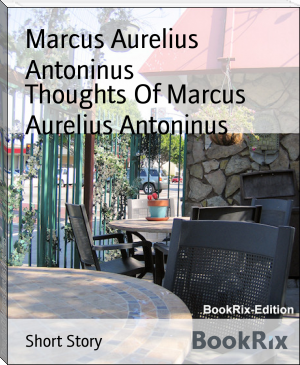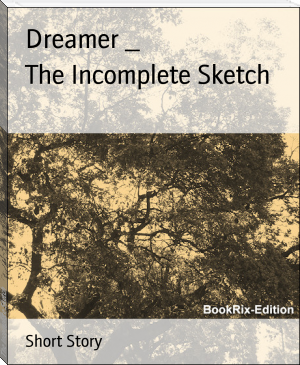Thoughts Of Marcus Aurelius Antoninus - Marcus Aurelius Antoninus (novels to read for beginners .TXT) 📗

- Author: Marcus Aurelius Antoninus
Book online «Thoughts Of Marcus Aurelius Antoninus - Marcus Aurelius Antoninus (novels to read for beginners .TXT) 📗». Author Marcus Aurelius Antoninus
And Leaves Other Men In His Place. So Society Exists, And A Social State
Is Manifestly The Natural State Of Man--The State For Which His Nature
Fits Him, And Society Amidst Innumerable Irregularities And Disorders
Still Subsists; And Perhaps We May Say That The History Of The Past And
Our Present Knowledge Give Us A Reasonable Hope That Its Disorders Will
Diminish, And That Order, Its Governing Principle, May Be More Firmly
Established. As Order Then, A Fixed Order, We May Say, Subject To
Deviations Real Or Apparent, Must Be Admitted To Exist In The Whole
Nature Of Things, That Which We Call Disorder Or Evil, As It Seems To
Us, Does Not In Any Way Alter The Fact Of The General Constitution Of
Things Having A Nature Or Fixed Order. Nobody Will Conclude From The
Existence Of Disorder That Order Is Not The Rule, For The Existence Of
Order Both Physical And Moral Is Proved By Daily Experience And All Past
Experience. We Cannot Conceive How The Order Of The Universe Is
Maintained: We Cannot Even Conceive How Our Own Life From Day To Day Is
Continued, Nor How We Perform The Simplest Movements Of The Body, Nor
How We Grow And Think And Act, Though We Know Many Of The Conditions
Which Are Necessary For All These Functions. Knowing Nothing Then Of The
Unseen Power Which Acts In Ourselves Except By What Is Done, We Know
Nothing Of The Power Which Acts Through What We Call All Time And All
Space; But Seeing That There Is A Nature Or Fixed Order In All Things
Known To Us, It Is Conformable To The Nature Of Our Minds To Believe
That This Universal Nature Has A Cause Which Operates Continually, And
That We Are Totally Unable To Speculate On The Reason Of Any Of Those
Disorders Or Evils Which We Perceive. This I Believe Is The Answer Which
May Be Collected From All That Antoninus Has Said.[A]
[A] Cleanthes Says In His Hymn:--
"For All Things Good And Bad To One Thou Formest,
So That One Everlasting Reason Governs All."
See Bishop Butler's Sermons. Sermon Xv., "Upon The Ignorance Of
Man."
The Origin Of Evil Is An Old Question. Achilles Tells Priam (Iliad,
24, 527) That Zeus Has Two Casks, One Filled With Good Things, And The
Other With Bad, And That He Gives To Men Out Of Each According To His
Pleasure; And So We Must Be Content, For We Cannot Alter The Will Of
Zeus. One Of The Greek Commentators Asks How Must We Reconcile This
Story 2 (The Philosophy Of Marcus Aurelius Antonius) Pg 29Doctrine With What We Find In The First Book Of The Odyssey, Where The
King Of The Gods Says, Men Say That Evil Comes To Them From Us, But They
Bring It On Themselves Through Their Own Folly. The Answer Is Plain
Enough Even To The Greek Commentator. The Poets Make Both Achilles And
Zeus Speak Appropriately To Their Several Characters. Indeed, Zeus Says
Plainly That Men Do Attribute Their Sufferings To Their Gods, But They
Do It Falsely, For They Are The Cause Of Their Own Sorrows.
[Illustration: The Appian Way, Rome]
Epictetus In His Enchiridion (C. 27) Makes Short Work Of The Question Of
Evil. He Says, "As A Mark Is Not Set Up For The Purpose Of Missing It,
So Neither Does The Nature Of Evil Exist In The Universe." This Will
Appear Obscure Enough To Those Who Are Not Acquainted With Epictetus,
But He Always Knows What He Is Talking About. We Do Not Set Up A Mark In
Order To Miss It, Though We May Miss It. God, Whose Existence Epictetus
Assumes, Has Not Ordered All Things So That His Purpose Shall Fail.
Whatever There May Be Of What We Call Evil, The Nature Of Evil, As He
Expresses It, Does Not Exist; That Is, Evil Is Not A Part Of The
Constitution Or Nature Of Things. If There Were A Principle Of Evil
([Greek: Archê]) In The Constitution Of Things, Evil Would No Longer Be
Evil, As Simplicius Argues, But Evil Would Be Good. Simplicius (C. 34,
[27]) Has A Long And Curious Discourse On This Text Of Epictetus, And It
Is Amusing And Instructive.
One Passage More Will Conclude This Matter. It Contains All That The
Emperor Could Say (Ii. 11): "To Go From Among Men, If There Are Gods, Is
Not A Thing To Be Afraid Of, For The Gods Will Not Involve Thee In Evil;
But If Indeed They Do Not Exist, Or If They Have No Concern About Human
Affairs, What Is It To Me To Live In A Universe Devoid Of Gods Or Devoid
Of Providence? But In Truth They Do Exist, And They Do Care For Human
Things, And They Have Put All The Means In Man's Power To Enable Him Not
To Fall Into Real Evils. And As To The Rest, If There Was Anything Evil,
They Would Have Provided For This Also, That It Should Be Altogether In
A Man's Power Not To Fall Into It. But That Which Does Not Make A Man
Worse, How Can It Make A Man's Life Worse? But Neither Through
Ignorance, Nor Having The Knowledge But Not The Power To Guard Against
Or Correct These Things, Is It Possible That The Nature Of The Universe
Has Overlooked Them; Nor Is It Possible That It Has Made So Great A
Mistake, Either Through Want Of Power Or Want Of Skill, That Good And
Evil Should Happen Indiscriminately To The Good And The Bad. But Death
Certainly And Life, Honor And Dishonor, Pain And Pleasure, All These
Things Equally Happen To Good And Bad Men, Being Things Which Make Us
Neither Better Nor Worse. Therefore They Are Neither Good Nor Evil."
The Ethical Part Of Antoninus' Philosophy Follows From His General
Principles. The End Of All His Philosophy Is To Live Conformably To
Nature, Both A Man's Own Nature And The Nature Of The Universe. Bishop
Butler Has Explained What The Greek Philosophers Meant When They Spoke
Of Living According To Nature, And He Says That When It Is Explained, As
He Has Explained It And As They Understood It, It Is "A Manner Of
Speaking Not Loose And Undeterminate, But Clear And Distinct, Strictly
Just And True." To Live According To Nature Is To Live According To A
Man's Whole Nature, Not According To A Part Of It, And To Reverence The
Divinity Within Him As The Governor Of All His Actions. "To The Rational
Story 2 (The Philosophy Of Marcus Aurelius Antonius) Pg 30Animal The Same Act Is According To Nature And According To Reason"[A]
(Vii. 11). That Which Is Done Contrary To Reason Is Also An Act Contrary
To Nature, To The Whole Nature, Though It Is Certainly Conformable To
Some Part Of Man's Nature, Or It Could Not Be Done. Man Is Made For
Action, Not For Idleness Or Pleasure. As Plants And Animals Do The Uses
Of Their Nature, So Man Must Do His (V. 1).
[A] This Is What Juvenal Means When He Says (Xiv. 321),--
"Nunquam Aliud Natura Aliud Sapientia Dicit."
Man Must Also Live Conformably To The Universal Nature, Conformably To
The Nature Of All Things Of Which He Is One; And As A Citizen Of A
Political Community He Must Direct His Life And Actions With Reference
To Those Among Whom, Among Other Purposes, He Lives.[A] A Man Must Not
Retire Into Solitude And Cut Himself Off From His Fellow-Men. He Must Be
Ever Active To Do His Part In The Great Whole. All Men Are His Kin, Not
Only In Blood, But Still More By Participating In The Same Intelligence
And By Being A Portion Of The Same Divinity. A Man Cannot Really Be
Injured By His Brethren, For No Act Of Theirs Can Make Him Bad, And He
Must Not Be Angry With Them Nor Hate Them: "For We Are Made For
Co-Operation, Like Feet, Like Hands, Like Eyelids, Like The Rows Of The
Upper And Lower Teeth. To Act Against One Another Then Is Contrary To
Nature; And It Is Acting Against One Another To Be Vexed And To Turn
Away" (Ii. 1).
[A] See Viii. 52; And Persius Iii. 66
Further He Says: "Take Pleasure In One Thing And Rest In It In Passing
From One Social Act To Another Social Act, Thinking Of God" (Vi. 7).
Again: "Love Mankind. Follow God" (Vii. 31). It Is The Characteristic Of
The Rational Soul For A Man To Love His Neighbor (Xi. 1). Antoninus
Teaches In Various Passages The Forgiveness Of Injuries, And We Know
That He Also Practised What He Taught. Bishop Butler Remarks That "This
Divine Precept To Forgive Injuries And To Love Our Enemies, Though To Be
Met With In Gentile Moralists, Yet Is In A Peculiar Sense A Precept Of
Christianity, As Our Saviour Has Insisted More Upon It Than On Any Other
Single Virtue." The Practice Of This Precept Is The Most Difficult Of
All Virtues. Antoninus Often Enforces It And Gives Us Aid Towards
Following It. When We Are Injured, We Feel Anger And Resentment, And The
Feeling Is Natural, Just, And Useful For The Conservation Of Society. It
Is Useful That Wrong-Doers Should Feel The Natural Consequences Of Their
Actions, Among Which Is The Disapprobation Of Society And The Resentment
Of Him Who Is Wronged. But Revenge, In The Proper Sense Of That Word,
Must Not Be Practised. "The Best Way Of Avenging Thyself," Says The
Emperor, "Is Not To Become Like The Wrong-Doer." It Is Plain By This
That He Does Not Mean That We Should In Any Case Practise Revenge; But
He Says To Those Who Talk Of Revenging Wrongs, Be Not Like Him Who Has
Done The Wrong. Socrates In The Crito (C. 10) Says The Same In Other
Words, And St. Paul (Ep. To The Romans, Xii. 17). "When A Man Has Done
Thee Any Wrong, Immediately Consider With What Opinion About Good Or
Evil He Has Done Wrong. For When Thou Hast Seen This, Thou Wilt Pity Him
And Wilt Neither Wonder Nor Be Angry" (Vii. 26). Antoninus Would Not
Deny That Wrong Naturally Produces The Feeling Of Anger And Resentment,
For This Is Implied In The Recommendation To Reflect On The Nature Of
Story 2 (The Philosophy Of Marcus Aurelius Antonius) Pg 31The Man's Mind Who Has Done





Comments (0)